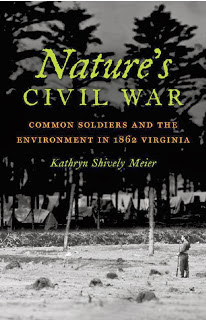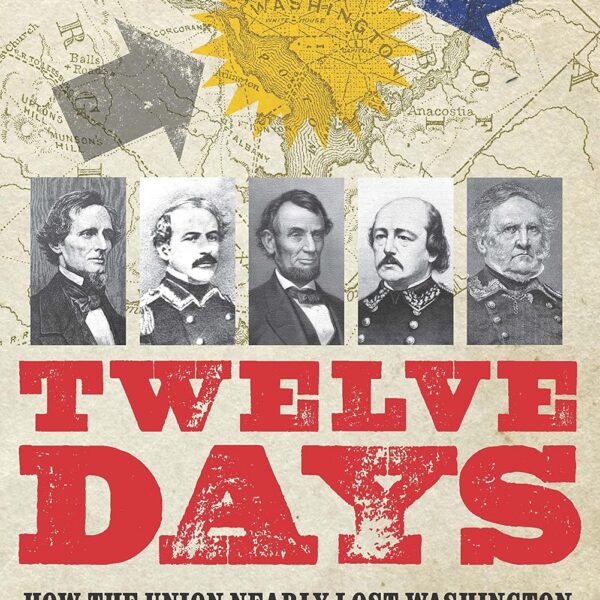Nature’s Civil War: Common Soldiers and the Environment in 1862 Virginia by Kathryn Shively Meier. University of North Carolina Press, 2013. Cloth, IBSN: 9781469610764. $39.95.
 Kathryn Shively Meier’s Nature’s Civil War analyzes the connection between environmental factors and soldiers’ wellbeing, as well as the various techniques soldiers used to maintain their health in camp and on the march. Historians have written at length about the “seasoning” period that occurred when soldiers first arrived in camp. But Meier reminds us that Civil War soldiering required men to weather disease and the natural elements throughout their enlistments. Battle, camp life, and long-term exposure each took their toll on soldiers and produced physical and mental ailments that threatened combat effectiveness. While the armies of both sides hurried to establish official systems to care for the wellbeing of their soldiers, Meier finds that most men established their own informal systems of care to maintain well-being while in the army.
Kathryn Shively Meier’s Nature’s Civil War analyzes the connection between environmental factors and soldiers’ wellbeing, as well as the various techniques soldiers used to maintain their health in camp and on the march. Historians have written at length about the “seasoning” period that occurred when soldiers first arrived in camp. But Meier reminds us that Civil War soldiering required men to weather disease and the natural elements throughout their enlistments. Battle, camp life, and long-term exposure each took their toll on soldiers and produced physical and mental ailments that threatened combat effectiveness. While the armies of both sides hurried to establish official systems to care for the wellbeing of their soldiers, Meier finds that most men established their own informal systems of care to maintain well-being while in the army.
Although her study is limited to 1862 Virginia – and the Peninsula and Shenandoah Valley campaigns in particular – Meier reaches beyond that year to trace soldiers’ understandings of their bodies. Her first chapter surveys pre-war ideas about health, both physical and mental, as well as antebellum notions of care. Before the war, men usually received care from family members in their own homes, rather than from professionals. Harboring a distrust of hospitals, then, soldiers maintained their own health by foraging for food and clean water, maintaining personal cleanliness, avoiding situations they linked to illness, caring for each other personally, and removing themselves from the ranks for periods of time to recover physically or mentally (straggling). Meier labels these tactics “self-care.”
Officers initially encouraged men in their “self-care” because it proved effective in maintaining healthy ranks. In fact, Meier argues that “self-care” was more effective in preventing illness and treating mental health than the official army system. However, 1862 proved a pivotal year in the development of stricter regulations, both within the army and within military medical care. By the end of the year, the army had cracked down on straggling and effectively made it harder for soldiers to pursue a major element of “self-care.” Meier uses this transition to illustrate the Civil War as a turning point in the understandings of health and medical care in the nineteenth century.
Meier uses a sample of soldier writings—letters, diaries, and post-war memoirs—from or about the winters of 1861-1862 to August 1862 to conduct a “bottom-up” approach to Civil War health and medical care. Previous studies of Civil War medicine have been conducted in a “top-down” manner, utilizing official records and the writings of surgeons and reformers who put their own agendas into writing. By using the writings of the soldiers themselves, Meier finds that the official statistics of disease during the war probably underestimate the number of soldiers affected by illness or infirmity. By analyzing the words of the common soldier, the true effects of the environment on the health of the soldier are understood—and their methods for maintaining health and sanity provide new insight on the field of soldier experience.
The study of the war’s impact on the environment is gaining more interest among scholars of the war, as are questions about mental trauma among Civil War soldiers. By connecting these two topics, Meier delivers a cutting-edge work that will surely propel scholarship forward. Even though her study is narrowly focused in time and place, her research raises many new questions for the field of soldier studies. Additionally, Meier is a wonderful writer. She has produced a book that is both enlightening and enjoyable to read.
Kathleen Logothetis Thompson is a Ph.D. candidate and graduate instructor at West Virginia University. Her current research explores manifestations of combat stress among Civil War soldiers.




